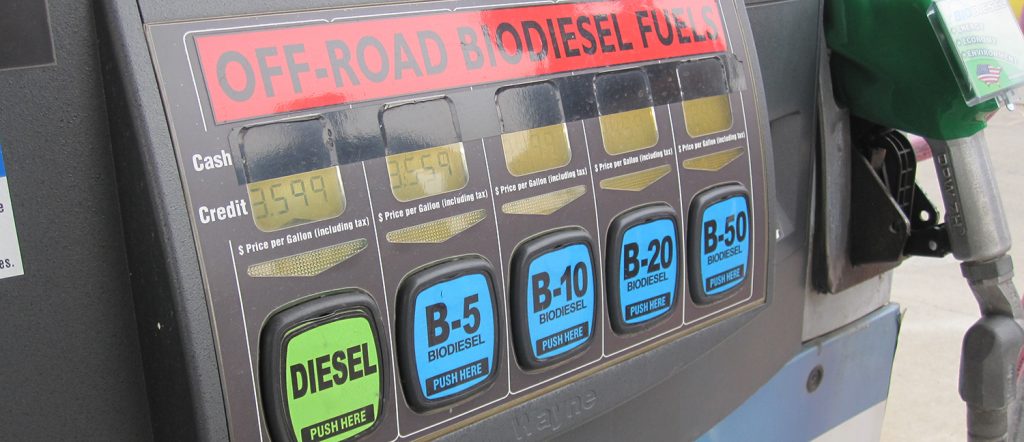While slightly lower than originally anticipated in December, the nation’s soybean growers remain pleased with the blending volumes announced June 3 by the Environmental Protection Agency, which include the largest-ever renewable volume obligation for biomass-based diesel and clear a troublesome backlog of small refinery exemption, or SRE, requests.
The 2022 finalized rule aligns with levels previously determined by Congress, setting the 2022 BBD volumes at 2.76 billion gallons, up from 2.43 billion for 2020 and 2021. The 2022 overall volumes are set at 20.63 billion gallons and retroactive volumes for 2021 at 18.84 billion gallons, 2020 at 17.13 billion gallons. These are the largest-ever volumes for total renewable fuels and specifically for BBD since the renewable fuel standard was created.
“We are happy to see these RVOs that are so important to the soy industry being set significantly higher than in previous years and take this news as a sign of support for the Renewable Fuel Standard going into 2023,” American Soybean Association President Brad Doyle said. “Additionally, we greatly appreciate the administration sticking to its commitment to no longer allow small refinery exemptions to continue being a means to skirt blending requirements.”
EPA denied 72 pending petitions from small refiners, clearing the backlog of SREs. Going forward, the agency will require new methodology for evaluating petitions. The final rule also confirms EPA will restore the 500 million gallons of biofuels that were wrongly waived in 2016, with 250 million supplemented in 2022 and the other half in 2023.
In addition to EPA’s announcement, USDA also announced nearly $700 million in payments for biofuel facilities it said will support the maintenance and success of the biofuels market for soy and corn producers, along with those biofuel producers, following COVID-19 hardships.
ASA has vocally supported both increased annual blending requirements and the denial of waivers, which erode the integrity of the RFS. Biodiesel is a key market for soy that uses soy oil at the same time soy meal can be used for protein-packed animal feed, and it is a clean-burning fuel alternative that likewise demonstrates soy growers’ commitment to using their U.S.-grown beans in more places more sustainably.
‘Restoring integrity’
Clean Fuels Alliance America also welcomed the EPA’s final rule for the 2021 and 2022 RFS volumes. The final rule recognizes the continued growth of biodiesel, renewable diesel and other clean fuels and establishes readily achievable program obligations. Clean Fuels supports EPA’s decision to deny pending small refinery exemptions and its consistent finding that the program benefits Americans without hardships for refiners.
“Clean Fuels and its members appreciate EPA Administrator Regan’s recognition that homegrown, clean fuels offer a better solution to high fuel prices stemming from high oil prices and supply shortages,” said Kurt Kovarik, vice president of federal affairs for Clean Fuels. “We support EPA’s efforts to get the Renewable Fuel Standard back on track and to finalize 2022 volumes as a jumping off point for future growth. We stand ready to work with the agency to move forward and set volumes for 2023 and beyond. And we encourage the agency to quickly finalize new feedstocks pathways, such as that for canola oil.”
“Biodiesel and renewable diesel are essential to keeping the U.S. economy moving right now, meeting more than five percent of the nation’s need for heavy duty transportation and shipping fuel. The clean fuels industry increased production and supply even during the economic emergency of the last few years, helping Americans save 4% on the cost of diesel fuel and all the other consumer items that rely on diesel fuel for shipping,” Kovarik added.
A recent study from the World Agricultural Economic and Environmental Service shows that U.S. biodiesel and renewable diesel production generates a 4% decrease in the price of diesel fuel. The WAEES study is available for download on cleanfuels.org.
“EPA’s denial of pending small refinery exemptions for 2019 through 2021 assures our industry that the volumes set today will be fully met, even with compliance flexibilities,” Kovarik said. “This is an important first step in restoring integrity to the program.”
The rule meets EPA’s consent decree with the U.S. Court of Appeals for the D.C. Circuit to finalize the 2021 and 2022 rules. EPA is currently taking comment on a proposed consent decree to finalize the 2023 RFS volumes and standards by April 2023.
The U.S. biodiesel and renewable diesel industry supports 65,000 U.S. jobs and more than $17 billion in economic activity each year. Every 100 million gallons of production supports 3,200 jobs and $780 million in economic opportunity. Biodiesel production supports approximately 13% of the value of each U.S. bushel of soybeans, adding an estimated dollar to the value of soybeans.





